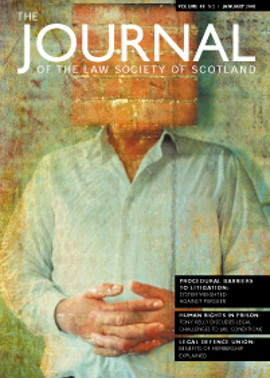Scottish Solicitors’ Discipline Tribunal
Richard John Hogarth Hetherington
A Complaint was made by the Council of the Law Society of Scotland against Richard John Hogarth Hetherington, Solicitor, 1 Marley Green, North Berwick (“the Respondent”). The Tribunal found the Respondent guilty of professional misconduct in respect of his failure to respond to the reasonable enquiries made of him by the Complainers and his failure to settle professional fees and accounts. The Tribunal censured the Respondent and Directed in terms of Section 53(5) of the Solicitors (Scotland) Act 1980 that any Practising Certificate held or to be issued to the Respondent shall be subject to such restriction as will limit him to acting as a qualified assistant to such employer or successive employers as may be approved by the Council of the Law Society of Scotland and that for a period of two years and thereafter until such time as he satisfies the Tribunal that he is fit to hold a full Practising Certificate.
The circumstances of the Complaint gave the Tribunal serious cause for concern in various material respects. Failure on the part of the Respondent to reply to correspondence from the Law Society hampers the Law Society in the performance of their statutory duty and is prejudicial to the reputation of the legal profession. A solicitor is expected to accept personal responsibility for the expenses incurred by professional witnesses, Counsel and other parties on behalf of their clients and the Respondent in failing to make payment has brought the profession into disrepute.
The Tribunal carefully considered the submissions on behalf of the Respondent and the evidence of his psychiatrist. It was clear that the Respondent’s responsibility for his actions had been substantially diminished by his mental illness. The Tribunal however did not find that his mental illness was a defence to the charge of professional misconduct. The Respondent continued to have the same professional responsibility incumbent on all solicitors to carry out the work entrusted to him with diligence and to respond to all reasonable enquiries in relation to his practice. The Tribunal however found the Respondent’s mental illness a strong mitigatory factor. Due to the possible reoccurrence of the Respondent’s illness the Tribunal placed a restriction on any future Practising Certificate to be issued to the Respondent. At the end of the period of restriction the Respondent will be required to satisfy the Tribunal that his medical condition is such that he is able to operate with an unrestricted Practising Certificate.
Robert Alistair Young
A Complaint was made by the Council of the Law Society of Scotland against Robert Alistair Young, Solicitor, 1 North Street, Elgin (“the Respondent”). The Tribunal found the Respondent guilty of professional misconduct in respect of his knowingly and deliberately presenting formal documents to the Court and an Insurance Company containing dishonest information of which he was aware contrary to Articles 7 and 8 of the Code of Conduct for solicitors holding Practising Certificates issued by the Law Society of Scotland in 1989. The Respondent was censured and fined £10,000.
The Tribunal considered that it was a fundamental principle and a cornerstone of the legal profession that a solicitor must not lie to a Court. In this case the Respondent knowingly presented a petition to a Sheriff on three different occasions and in respect of two separate executries containing dishonest averments which he knew to be dishonest. The Respondent also filled in dishonest information on an application to an Insurance Company which he signed and he again knew that this was an untrue statement. The Respondent knew that the information was not just misleading but false. Due to the very serious view that the Tribunal takes of a solicitor acting dishonestly the Tribunal censured the Respondent and imposed the maximum fine of £10,000. The Tribunal noted that the Respondent had accepted that his actions amounted to professional misconduct, had co-operated with the Fiscal at an early state and would continue to work within the structure of a partnership. The Tribunal also took into account the evidence in mitigation given by the Respondent’s senior partner and accordingly the Tribunal did not think that there was any necessity in the public interest to restrict the Respondent’s Practising Certificate.
In this issue
- Obituary: John Downie Herd
- Obituary: Bill Liddell
- The tyranny of fact pleadings
- Bringing human rights to the prison population
- Pragmatic solutions to udal law
- Take care framing pleas in law
- Everything but the kitchen sink?
- Serving solicitors in time of need
- Scottish Solicitors’ Discipline Tribunal
- Website reviews
- Rough guide to controlling critical dates
- Europe
- Plain speaking
- Book reviews






